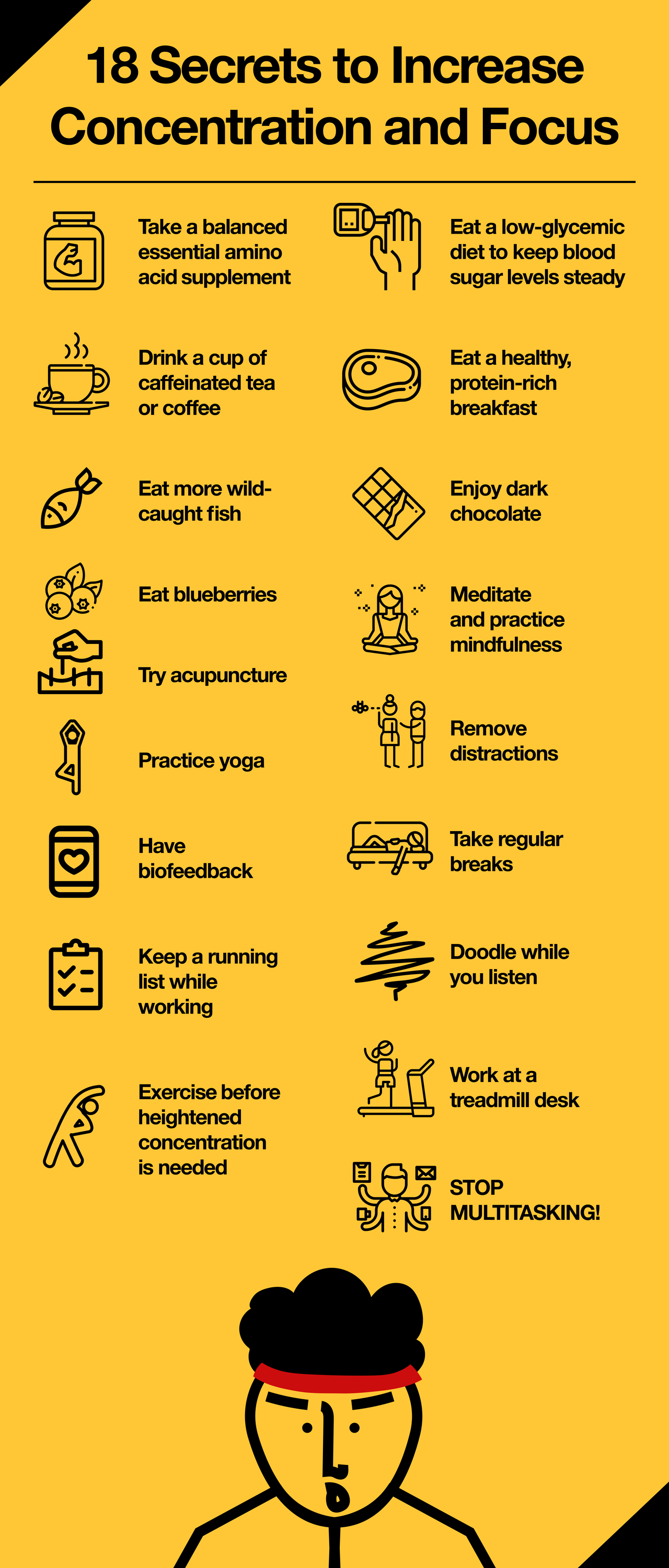How Can I Increase My Concentration and Focus?
 By: by Amino Science
By: by Amino Science

Do you find yourself constantly distracted and less productive than you would like to be? Maybe you have recently taken a memory test that left you asking “how can I increase my concentration and focus?”
In today’s hectic, 24x7 technology-driven world, it is easy to become distracted by the constant interruptions. There is conflicting research concerning concentration exercises and tests and whether or not they work. Fortunately, there are proven ways you can increase your concentration and boost focus through a combination of nutrition, complementary health practices, and some simple (and not so simple) lifestyle changes.
How Can I Increase My Concentration and Focus with Nutrition?
The foods we eat and the supplements we take directly improve or degrade our brain power. To improve concentration, focus, and memory, consider incorporating one or more of the following nutritional suggestions.
1. Amino Acids
According to Harris R. Lieberman of the U.S. Army Research Institute of Environmental Medicine, the amino acid tryptophan is “essential for optimal brain function and cognitive performance.” Mr. Lieberman states that reduced levels of tryptophan increase aggression and depression and induce drowsiness. In the book he authored, The Role of Protein and Amino Acids in Sustaining and Enhancing Performance, he also makes a note of the role that tyrosine plays in the brain.
Mr. Lieberman explains that while tryptophan is more critical generally for brain function, tyrosine is more essential for cognition when the body is under stress. He hypothesizes that when humans are under physical pressure or psychological stress, or are in extreme environments, the brain needs more amino acids for proper functioning.
However, it’s not as simple as taking a tryptophan or tyrosine supplement to increase concentration and focus. These amino acids must be optimally balanced, and increasing levels of one can decrease levels of the other, leading to more brain fog and lack of focus. For this reason, it is best to supplement with a balanced concentration of all the essential amino acids formulated at optimal doses.
To learn more about how amino acids can boost brain power, and how to best supplement, check out this article here.
2. Low-Glycemic Diet
When we eat foods that cause wild swings in blood glucose levels, the human body experiences bursts of energy and focus followed by fatigue and poor concentration. In order to keep blood glucose levels steady, focus on consuming low-glycemic foods like whole grains, sweet potatoes, legumes, non-starchy vegetables, and protein. Protein should be consumed with every snack and meal to improve focus and concentration.
3. Drink a Cup of Tea or Coffee
Caffeine improves concentration and enhances memory, and it’s considered a relatively safe stimulant. The healthiest sources of caffeine are green tea, matcha, black tea, and coffee. Avoid commercially processed energy drinks and fancy coffee drinks with sugar (and sugar substitutes!) that will cause your blood sugar to rise and fall. And remember, caffeine is a stimulant that can make you jittery and unable to concentrate and sit still if you consume too much.
4. Eat a Healthy, Protein-Rich Breakfast
On days when you need your brain to be in top form, eat a hearty and healthy breakfast. Eat high-quality protein like eggs with high-fiber whole grains, some dairy, fresh fruit, and healthy fats every morning to start your day off right. Avocado whole-grain toast and a poached egg anyone?
5. Eat More Wild-Caught Fish
Omega-3 fatty acids feed the brain and are key for focus and concentration. According to a small clinical trial published in the peer-reviewed journal Nature Clinical Practice of Neurology, eating fish rich in long-chain omega-3 fatty acids slows cognitive decline. Additionally, essential omega-3 fatty acids, particularly DHA, is necessary for maintaining normal function of the brain according to a systematic review published in the journal Nutrition.
6. Enjoy Dark Chocolate
Dark chocolate, or even better, cacao, can boost mental focus because of its high antioxidant powers, caffeine content, and healthy fats. Epicatechin, a flavanol found in dark chocolate, was shown to enhance memory formation in a trial with snails. Additional animal trials have provided similar results showing that dark chocolate protects the brain and improves cognitive function.
7. Eat Blueberries
The phytochemicals in blueberries have been shown to protect against free-radical damage that may lead to Alzheimer's disease or dementia. And a recent study published in the journal Applied Physiological Nutrition Metabolism has found that supplementation with blueberry concentrates improves brain circulation and activates areas of the brain associated with cognitive function.
How Can I Increase My Concentration and Focus with Complementary Therapies?
In addition to diet, the following complementary practices and therapies have been proven to boost concentration and focus.
1. Meditation and Mindfulness Practices
According to William Klemm, Ph.D., a senior professor for Neuroscience at Texas A&M University, meditation teaches your brain how to focus, contributes to peace of mind, and even lowers blood pressure. Regular meditation practice can significantly increase attention span by strengthening your ability to sustain focus while battling monkey mind. Monkey mind is the concept of tempting intruding thoughts that take your focus off the task at hand.
Another study published in the Journal of the Royal Army Medical Corps has found that mindfulness practice promotes resilience and mental fitness in the UK Armed Forces. The researchers note that mindfulness increases specific cognitive markers, including sustained attention and cognition while under stress.
2. Acupuncture
According to a randomized, single-blind study published in the Journal of Acupuncture and Meridian Studies, acupuncture improves memory and reduces anxiety during testing. The study group that received acupuncture scored 9.5% higher than the control group, and the acupuncture group committed 36% fewer math errors on exams.
3. Yoga
A recent study from researchers from the Department of Psychology at Texas State University has found that six sessions of yoga improved working memory. The research shows that regular yoga practice may enhance cognition. The researchers urge further randomized controlled trials to fully evaluate the effectiveness of yoga as a way to improve cognition and focus.
4. Biofeedback
Biofeedback is a process that uses instruments to help individuals gain greater psychological awareness. And now researchers have shown that biofeedback training can significantly improve concentration in individuals with ADHD and substantially improve neuropsychological parameters.

How Can I Increase My Concentration and Focus with Lifestyle?
In addition to addressing nutrition and trying complementary practices, you can improve concentration and focus by changing certain habits and incorporating new methods in your life.
1. Remove Distractions
One of the top ways to improve concentration is to disconnect from technology while you are working or studying. Turn off social media alerts, log out of your email, silence your phone, and keep music at a low volume. If you find that your mind wanders because of a loud environment that you can't control, wear earplugs or noise-canceling headphones if necessary. One study has found that “infomania,” or the distraction of technology products, causes a 10-point drop in IQ, more than twice the drop caused by smoking marijuana!
2. Keep a Running List
Did you know that each time your mind wanders, it can take 20 to 25 minutes to re-engage with your previous activity? It is natural to have tasks, ideas, and concerns pop into your mind while you are trying to focus—the key is the way you manage these mental distractions. One of the best ways is to keep a running task list on your desk. Quickly note items that need further attention when you have completed your project.
3. Take Regular Breaks
Powering through a task is not always the best way to maintain focus and concentration. In fact, many people find that concentrating for 45 minutes and then taking a 10-minute break can actually improve your attention when you return to work. During the 10-minute break, listen to music, run or walk in place, grab a cup of coffee, stretch, and give your eyes a chance to refocus—but don't make business calls, go over your to-do list, or answer emails. Use the 10 minutes as a real break.
4. Physical Exercise
According to a study from the University of Illinois at Urbana-Champaign, students who engage in moderate physical exercise before a test performed better than students who don’t exercise. Regular exercise helps our brains learn to ignore distractions—but researchers aren’t quite sure why.
As an added bonus, if you love to run, run in organized races whenever you can! According to a new report in The Journal of Positive Psychology, recreational runners that participate in organized competitions experience more positive emotions, have higher self-esteem and confidence, are more satisfied with life, and feel their lives have more meaning than recreational runners that don’t run in organized races. Researchers note that running in a race provides a psychological reward that carries through after the races and may impact brain power.
You can couple the energy-increasing and performance-enhancing benefits of amino acids in Amino Co's athletic performance blend Perform. Learn more here.
5. Doodle
Do you doodle? If so, you are boosting your concentration—at least according to an article in the journal Applied Cognitive Psychology. In a small study, half of the participants were assigned doodling while listening to a telephone call and the other half didn’t doodle during the same telephone call. The result? The doodling group recalled 29% more information on a surprise memory test than the group that didn’t doodle.
6. Work at a Treadmill Desk
We've all heard that "sitting is the new smoking" and that we should move more. And now a study from neuroscientists in Canada suggests that working or studying at a treadmill desk actually increases concentration and memory. The researchers of this small study focused on students walking at a rate of 1.4 miles per hour (2.25 kilometers per hour) for 40 minutes. After they got off the treadmill, they were tested for comprehension of the information they'd read during the 40 minutes. The treadmill group showed superior memory performance, scoring an astounding 34.9% higher than those who studied at a traditional desk.
7. Stop Multitasking
Multitasking is the arch-enemy of concentration. It can interfere with your ability to learn and remember relevant information. Research has identified a particularly shocking danger—multitasking is associated with smaller gray-matter density. Other scientific studies have shown that multitasking adversely affects working memory and long-term memory and inhibits learning in a classroom environment.
Time management experts estimate that multitasking can decrease productivity by as much as 40%. You may think you are accomplishing more—but you aren’t! During times you need heightened concentration and focus, turn off distractions, stay present in the moment, and complete the task you are working on before moving forward.

Up to 25% off Amino
Shop NowTAGS: anti-aging natural cures
Join the Community
Comments (0)
Most Craveable Recipes




 833-264-6620
833-264-6620



















